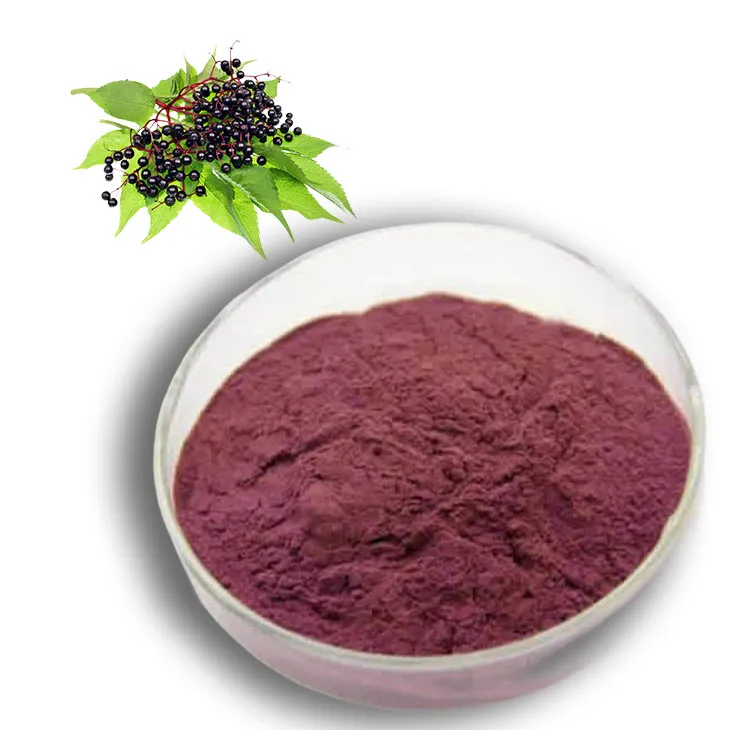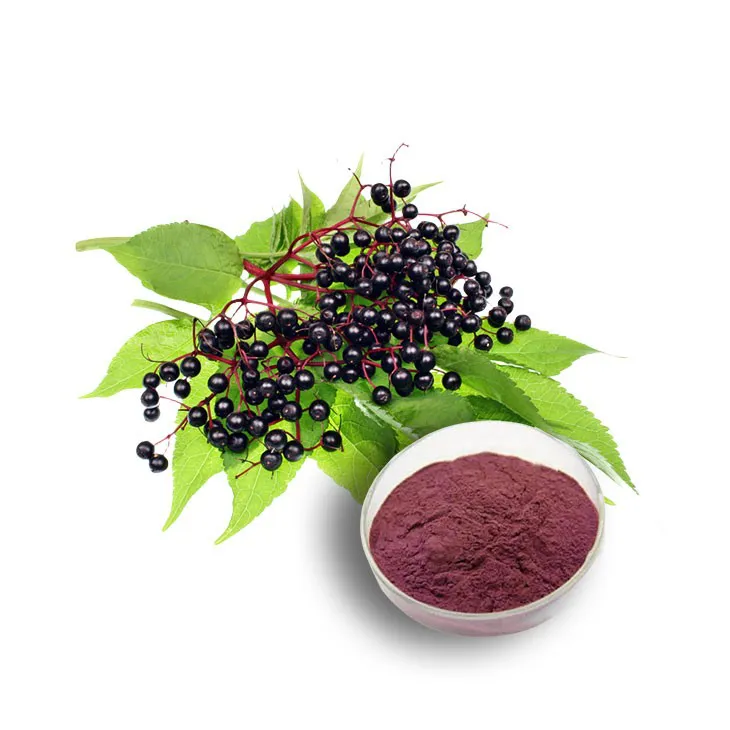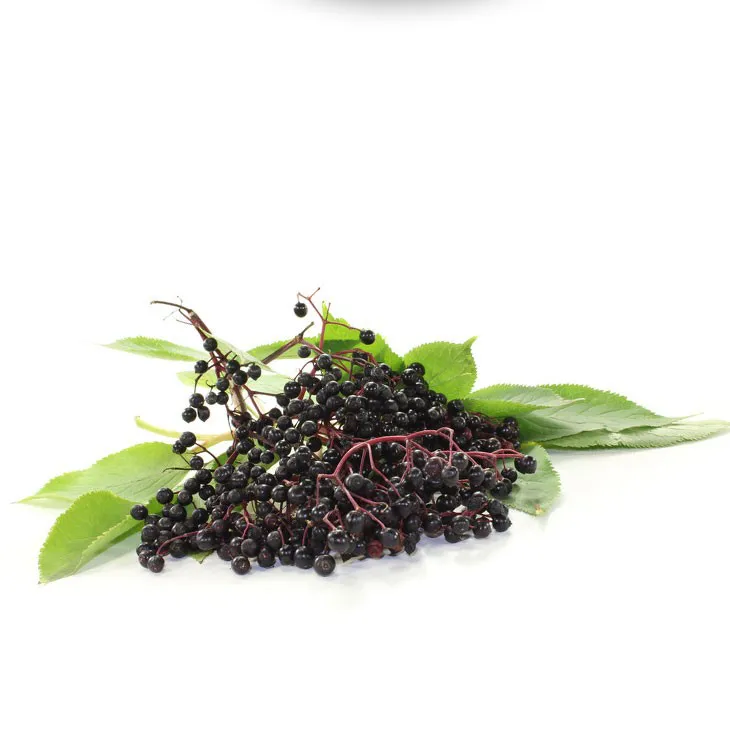- 0086-571-85302990
- sales@greenskybio.com
The flavor of ripe elderberries and natural elderberry extracts.
2024-11-11

1. Introduction
Mature elderberries have long been a subject of interest, not only for their distinct flavor but also for the numerous properties that their extracts possess. In recent years, natural Elderberry Extracts have gained significant popularity across various industries, including food, medicine, and cosmetics. This article aims to provide a comprehensive exploration of the flavor of ripe elderberries and the many aspects of natural Elderberry Extracts.

2. The Flavor of Ripe Elderberries
Ripe elderberries offer a flavor profile that is both rich and complex. When tasted, one can detect a range of notes that contribute to its overall taste.
2.1 Slight Tartness
One of the prominent aspects of the flavor of ripe elderberries is their slight tartness. This tartness is not overpowering but rather adds a refreshing quality to the berry. It is this element that gives the elderberry a certain zing, making it stand out among other berries. The tartness is likely due to the presence of certain organic acids within the berry. These acids interact with the taste buds on the tongue, creating a sensation that is both tangy and pleasant.
2.2 Sweetness
Contrasting with the tartness is the sweetness of ripe elderberries. As the berries ripen, they develop a natural sweetness that balances out the tart flavor. This sweetness is not overly sugary but has a mellow and fruity quality. It is the harmonious combination of tartness and sweetness that makes the flavor of ripe elderberries so appealing. The sugars present in the berries, such as fructose, contribute to this sweet taste. When consumed, the taste buds first register the tartness, which is then followed by the slow release of the sweet flavor, creating a multi - layered taste experience.
2.3 Other Subtle Notes
Beyond the tartness and sweetness, there are other subtle notes in the flavor of ripe elderberries. There is a hint of earthiness, which gives the impression that the berries are deeply connected to the soil from which they grow. This earthy note is often described as a grounding flavor, adding depth to the overall taste. Additionally, some people detect a faint floral aroma in the taste, which might be attributed to the presence of certain volatile compounds. These floral undertones add a touch of elegance to the flavor, making it more nuanced and complex.

3. Extraction Methods of Natural Elderberry Extracts
There are several methods used to extract the beneficial compounds from elderberries to create natural elderberry extracts.
3.1 Solvent Extraction
Solvent extraction is a commonly used method. In this process, a solvent such as ethanol or water is used to dissolve the active compounds from the elderberries. Ethanol is often preferred as it can effectively extract a wide range of compounds, including flavonoids and anthocyanins. The berries are first crushed or ground to increase the surface area for extraction. Then, the solvent is added, and the mixture is allowed to soak for a period of time. After that, the solvent containing the dissolved compounds is separated from the solid residue through filtration or centrifugation. The resulting liquid is then concentrated to obtain the elderberry extract.
3.2 Supercritical Fluid Extraction
Supercritical fluid extraction is a more advanced technique. Supercritical carbon dioxide is used as the extraction medium. The advantage of this method is that it can operate at relatively low temperatures, which helps to preserve the heat - sensitive compounds in the elderberries. Carbon dioxide in its supercritical state has properties similar to both a gas and a liquid, allowing it to penetrate the plant material effectively and extract the desired compounds. After the extraction, the carbon dioxide can be easily removed by reducing the pressure, leaving behind a pure and high - quality elderberry extract.

4. Health Benefits of Natural Elderberry Extracts
Natural elderberry extracts are renowned for their numerous health benefits.
4.1 Immune - Boosting Properties
- One of the most well - known benefits is their immune - boosting effect. Elderberries are rich in flavonoids, such as anthocyanins, which have antioxidant properties. These antioxidants help to protect the body's cells from damage caused by free radicals. By reducing oxidative stress, the immune system is better able to function optimally.
- Studies have shown that elderberry extracts can stimulate the production of cytokines, which are proteins involved in the immune response. This stimulation helps to enhance the body's ability to fight off infections, particularly viral infections such as the common cold and influenza.
4.2 Anti - Inflammatory Effects
The anti - inflammatory effects of elderberry extracts are also significant. Chronic inflammation is associated with many diseases, including heart disease, diabetes, and arthritis. The compounds in elderberry extracts can help to reduce inflammation in the body by inhibiting the production of inflammatory mediators. This can lead to a reduction in symptoms associated with inflammatory conditions and potentially slow down the progression of these diseases.
4.3 Antioxidant Activity
As mentioned earlier, elderberries are a rich source of antioxidants. The antioxidant activity of elderberry extracts helps to scavenge free radicals in the body. Free radicals are unstable molecules that can cause damage to cells, proteins, and DNA. By neutralizing these free radicals, elderberry extracts contribute to overall health and may help to prevent the development of certain diseases, such as cancer and neurodegenerative disorders.
5. Uses of Natural Elderberry Extracts in the Food Industry
Natural elderberry extracts have found a variety of uses in the food industry.
5.1 Flavoring Agent
Due to their unique flavor, elderberry extracts are used as a flavoring agent in many food products. They can add a fruity and slightly tart flavor to beverages such as juices, smoothies, and wines. In baked goods, elderberry extracts can enhance the flavor, providing a distinct taste that sets the product apart from others. The complex flavor profile of elderberry extracts allows them to be used in both sweet and savory products, depending on the desired taste.
5.2 Colorant
Elderberry extracts are also used as a natural colorant. The anthocyanins present in the extracts give a deep purple - red color, which is highly desirable in many food products. This natural colorant is a healthier alternative to synthetic dyes, as it is derived from a natural source and is free from many of the potential health risks associated with artificial colorants. It can be used to color jams, jellies, candies, and even some dairy products.
6. Uses of Natural Elderberry Extracts in the Medicine Industry
In the medicine industry, natural elderberry extracts play an important role.
6.1 Dietary Supplements
Elderberry extracts are commonly formulated into dietary supplements. These supplements are often taken to support the immune system, especially during the cold and flu season. They are available in various forms, such as capsules, tablets, and liquid extracts. The extracts are typically standardized to contain a certain amount of active compounds, ensuring consistent quality and effectiveness.
6.2 Traditional Medicine Applications
Elderberry has a long history of use in traditional medicine. It has been used to treat various ailments, including coughs, colds, and fevers. In some cultures, elderberry preparations were made into syrups or teas for medicinal purposes. Although modern medicine has advanced, the traditional uses of elderberry are still being explored, and some of these traditional remedies are being incorporated into contemporary healthcare practices.
7. Uses of Natural Elderberry Extracts in the Cosmetics Industry
The cosmetics industry has also recognized the potential of natural elderberry extracts.
7.1 Skin Health
The antioxidant and anti - inflammatory properties of elderberry extracts make them beneficial for skin health. They can be used in skincare products such as creams, lotions, and serums to protect the skin from environmental damage. The extracts can help to reduce inflammation in the skin, which is beneficial for those with conditions such as acne or eczema. Additionally, the antioxidants in the extracts can help to slow down the aging process by preventing free - radical - induced damage to the skin cells.
7.2 Hair Care
Elderberry extracts can also be used in hair care products. They can help to strengthen the hair shaft, reducing breakage and promoting hair growth. The nutrients in the extracts can nourish the hair follicles, improving the overall health of the hair. In shampoos and conditioners, elderberry extracts can add shine and manageability to the hair.
8. The Relationship between the Flavor of Ripe Elderberries and the Properties of Their Extracts
The flavor of ripe elderberries is closely related to the properties of their extracts.
8.1 Flavor and Bioactive Compounds
The bioactive compounds in elderberries, such as flavonoids and anthocyanins, contribute not only to the health benefits but also to the flavor. These compounds have a certain taste profile that is reflected in the overall flavor of the berries. For example, the anthocyanins, which are responsible for the color of the berries and extracts, also add a slightly astringent taste, which is part of the complex flavor of elderberries.
8.2 Flavor and Extraction Processes
The extraction processes can also affect the flavor of the resulting extracts. For instance, solvent extraction using ethanol may extract some volatile compounds that contribute to the flavor. However, if the extraction process is not carefully controlled, some of these volatile compounds may be lost, resulting in a less flavorful extract. On the other hand, supercritical fluid extraction, which operates at lower temperatures, may be better at preserving the delicate flavor compounds of the elderberries.
9. Conclusion
In conclusion, ripe elderberries possess a unique and complex flavor that combines tartness, sweetness, and other subtle notes. Natural elderberry extracts, obtained through various extraction methods, have a wide range of health benefits and are used in multiple industries. The flavor of the berries is related to the properties of the extracts, and both are of great significance in different fields. As the demand for natural products continues to grow, elderberries and their extracts are likely to gain even more attention in the future, both for their flavor and their beneficial properties.
FAQ:
What is the main flavor characteristic of ripe elderberries?
Ripe elderberries have a rich and complex flavor. Their taste ranges from slightly tart to sweet, which makes them quite distinct.
What are the common extraction methods for natural elderberry extracts?
Common extraction methods for natural elderberry extracts include solvent extraction, such as using ethanol or water as solvents. Another method is cold - pressing, which can extract the juice from elderberries and then further process it to obtain the extract. Maceration is also sometimes used, where the elderberries are soaked in a solvent for a period to extract the desired components.
What are the health benefits of natural elderberry extracts?
Natural elderberry extracts are believed to have several health benefits. They are rich in antioxidants, which can help fight against free radicals in the body. Some studies suggest that they may boost the immune system, helping the body to defend against infections. They also may have anti - inflammatory properties, which can be beneficial for various health conditions.
How are natural elderberry extracts used in the food industry?
In the food industry, natural elderberry extracts are used as natural flavorings. They can be added to jams, jellies, and syrups to give a unique flavor. Some beverages, such as juices and wines, may also use elderberry extracts to enhance their taste. Additionally, they can be used in baked goods to add a touch of unique flavor.
How are natural elderberry extracts used in the medicine and cosmetics industries?
In the medicine industry, due to their potential health - promoting properties like immune - boosting and anti - inflammatory effects, they may be used in supplements. In the cosmetics industry, elderberry extracts can be used in skincare products. Their antioxidant properties can help protect the skin from damage caused by environmental factors, and they may also contribute to improving the skin's overall appearance.
Related literature
- The Flavor Profile and Chemical Composition of Elderberries"
- "Health - Promoting Properties of Natural Elderberry Extracts"
- "Applications of Elderberry Extracts in the Food and Beverage Industry"
- "Elderberry Extracts in Medicine: Current Research and Future Prospects"
- "The Use of Elderberry Extracts in Cosmetics: A Review"
- ▶ Hesperidin
- ▶ Citrus Bioflavonoids
- ▶ Plant Extract
- ▶ lycopene
- ▶ Diosmin
- ▶ Grape seed extract
- ▶ Sea buckthorn Juice Powder
- ▶ Fruit Juice Powder
- ▶ Hops Extract
- ▶ Artichoke Extract
- ▶ Mushroom extract
- ▶ Astaxanthin
- ▶ Green Tea Extract
- ▶ Curcumin
- ▶ Horse Chestnut Extract
- ▶ Other Product
- ▶ Boswellia Serrata Extract
- ▶ Resveratrol
- ▶ Marigold Extract
- ▶ Grape Leaf Extract
- ▶ New Product
- ▶ Aminolevulinic acid
- ▶ Cranberry Extract
- ▶ Red Yeast Rice
- ▶ Red Wine Extract
-
Black Garlic Extract
2024-11-11
-
melatonin extract
2024-11-11
-
Buckthorn bark extract
2024-11-11
-
Beta Carotene
2024-11-11
-
Cactus Extract
2024-11-11
-
Lycopene
2024-11-11
-
Natural grape seed extract
2024-11-11
-
Saffron Extract Powder
2024-11-11
-
Fig Extract
2024-11-11
-
Almond Extract Powder
2024-11-11





















